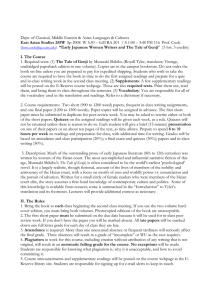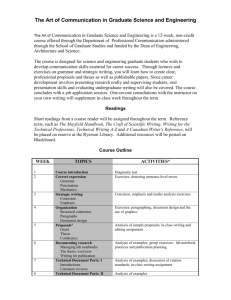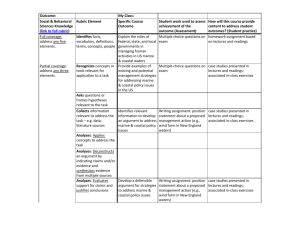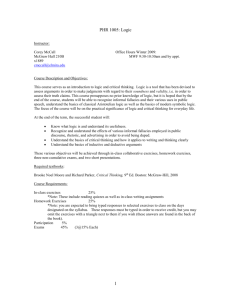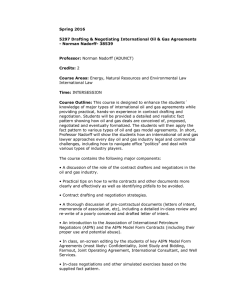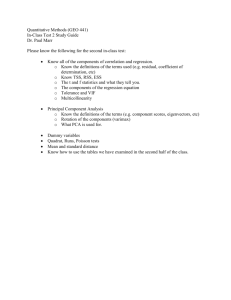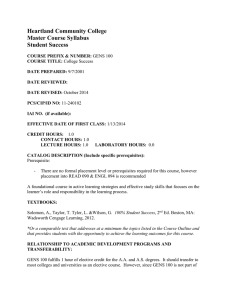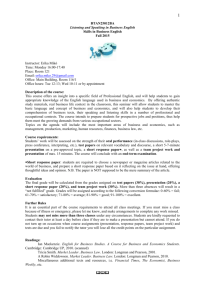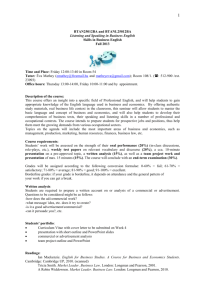Services Marketing - C.T. Bauer College of Business
advertisement
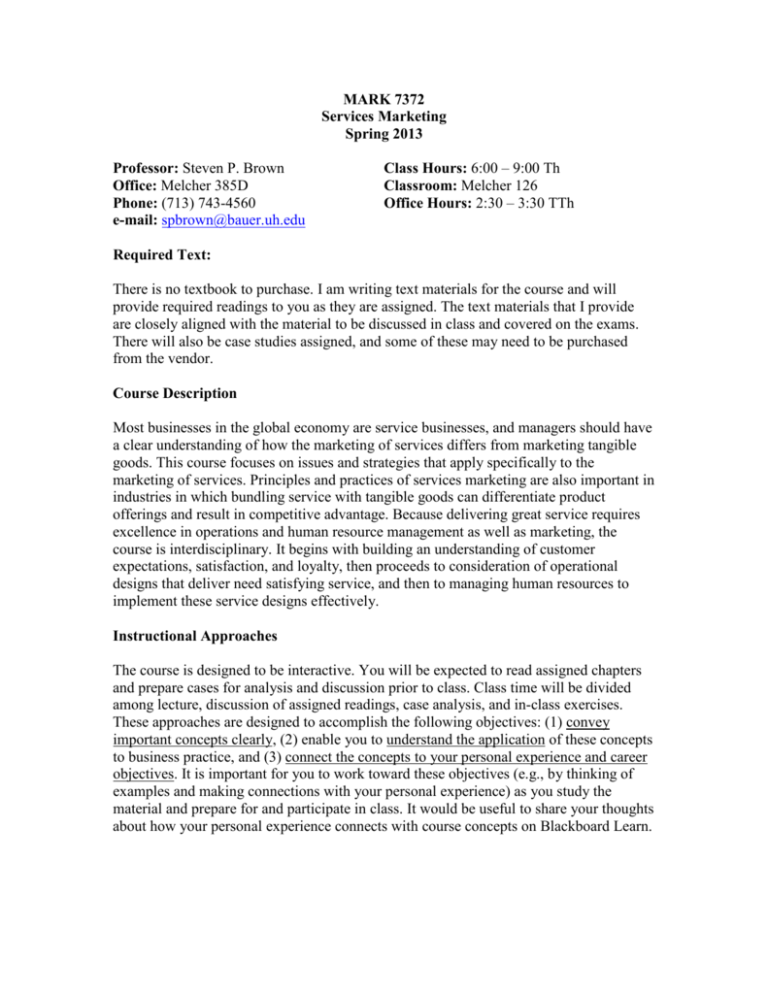
MARK 7372 Services Marketing Spring 2013 Professor: Steven P. Brown Office: Melcher 385D Phone: (713) 743-4560 e-mail: spbrown@bauer.uh.edu Class Hours: 6:00 – 9:00 Th Classroom: Melcher 126 Office Hours: 2:30 – 3:30 TTh Required Text: There is no textbook to purchase. I am writing text materials for the course and will provide required readings to you as they are assigned. The text materials that I provide are closely aligned with the material to be discussed in class and covered on the exams. There will also be case studies assigned, and some of these may need to be purchased from the vendor. Course Description Most businesses in the global economy are service businesses, and managers should have a clear understanding of how the marketing of services differs from marketing tangible goods. This course focuses on issues and strategies that apply specifically to the marketing of services. Principles and practices of services marketing are also important in industries in which bundling service with tangible goods can differentiate product offerings and result in competitive advantage. Because delivering great service requires excellence in operations and human resource management as well as marketing, the course is interdisciplinary. It begins with building an understanding of customer expectations, satisfaction, and loyalty, then proceeds to consideration of operational designs that deliver need satisfying service, and then to managing human resources to implement these service designs effectively. Instructional Approaches The course is designed to be interactive. You will be expected to read assigned chapters and prepare cases for analysis and discussion prior to class. Class time will be divided among lecture, discussion of assigned readings, case analysis, and in-class exercises. These approaches are designed to accomplish the following objectives: (1) convey important concepts clearly, (2) enable you to understand the application of these concepts to business practice, and (3) connect the concepts to your personal experience and career objectives. It is important for you to work toward these objectives (e.g., by thinking of examples and making connections with your personal experience) as you study the material and prepare for and participate in class. It would be useful to share your thoughts about how your personal experience connects with course concepts on Blackboard Learn. Course Grades Overall course grades will be determined by performance on the following criteria: 2 Tests @ 100 each = Group case analysis Class participation 200 points 75 points 75 points Total 350 points Final course grades will be determined according to the following distribution: Final Total 322 – 350 315 – 321 308 – 314 287 – 307 280 – 286 273 – 279 252 – 272 245 – 251 Grade A AB+ B BC+ C C- Tests There are two tests, as noted on the schedule below. Neither is cumulative. The first test They will consist of a combination of multiple choice, definitions, and short answer questions. Anything covered in the assigned readings and during class sessions is fair game for inclusion on the tests. To do well, there is no substitute for staying current on your reading and taking good notes. I give partial credit for short answer questions, so it is not wise to leave blanks. I can’t give partial credit for those. Group Project Every student needs to become a member of a task-focused group consisting of a maximum of five members. During the semester, we will do a number of in-class group exercises to build understanding through practice of concepts and processes described in readings and lecture. The group project will involve analysis and decision-making on a case that I will assign to you the week after spring break. The project deliverables consist of a short paper (maximum eight double-spaced pages), and an in-class presentation during the next to last week of class. The project grade will be based on (1) strength of the analysis and solution (45 points), (2) grammar, style, and clarity of the written presentation (15 points), and (3) effectiveness of the in-class presentation (how clear and convincing it is and how engaging to the audience, 15 points). Class Participation Active learning approaches only work to the extent that students come prepared and willing to engage in thoughtful discussion of assigned topics. In this class, we will be discussing a number of cases that present real world service problems and call for analysis and decisions on possible courses of action. These can be great learning experiences, but only if you have read the case and thought about the issues enough to participate substantively. We will also do a number of exercises in class that require preparation and focused attention. Your participation grade is based upon the quality and consistency of your contributions to class discussion during the semester. Quality of participation counts for more than quantity. To make the best contributions to discussions, you need to (1) prepare assignments studiously and focus your thinking on assigned topics, (2) listen carefully to what others say and then advance the discussion in a productive direction, and (3) offer your comments clearly and succinctly. On one hand, it is possible to “over contribute” (i.e., dominate the discussion), whereas, on the other hand, you cannot contribute at all if you are unwilling to talk. I will cold call on individuals who don’t volunteer and attempt by all means to distribute “air time” equitably. No one is invisible. Expression of differing points of view is strongly encouraged, and respect for the thoughts of others with whom you may disagree is imperative. Ground Rules Please abide by the following ground rules for in class conduct. 1. No food consumption in class. Drinks are okay. 2. No smart phones (talking, texting, games, web browsing, etc.). 3. No use of computers during case discussions. You need to tune into the discussion, not into your computer. 4. During class discussions, one person talks at a time. Side conversations are distracting and counterproductive. I will not hesitate to remind you of these rules in class when it becomes necessary. Academic Honesty The University of Houston Academic Honesty Policy is strictly enforced by the C. T. Bauer College of Business. No violations of this policy will be tolerated in this course. A discussion of the policy is included in the University of Houston Student Handbook, http://www.uh.edu/dos/hdbk/acad/achonpol.html. Students are expected to be familiar with this policy. Accommodations for Students with Disabilities The C. T. Bauer College of Business would like to help students who have disabilities achieve their highest potential. To this end, in order to receive academic accommodations, students must register with the Center for Students with Disabilities (CSD) (telephone 713-743-5400), and present approved accommodation documentation to their instructors in a timely manner. Schedule Date Jan. 17 Topic Course Introduction An X-Ray of Services Assignment Ch. 1 24 Living the Service Brand Case: Hospital Corp. of America Ch. 2 31 Defensive Marketing & the Bottom Line La Posada al Lago (A) Ch. 3 Attributes and Expectations Case: Measuring Quality at Disneyland Paris Ch. 4 14 The Gaps Model Case: Eurodisney (Abbreviated) Ch. 5 21 Tuning into the Voice of the Customer Qualitative Research Exercise Ch. 6 28 Service Design Case: Getting the Bugs Out (Blueprinting) Ch. 7 Feb. 7 Mar. 7 Test 1 14 SPRING BREAK SPRING BREAK 21 Developing Priorities for Process Improvements Case: La Posada al Lago (B) Ch. 8 29 Service Recovery Case: JetBlue Ch. 9 Employee Roles in Service Delivery Case: The Guild Shop Ch. 10 Customer Roles in Service Delivery Case: Zipcar: Influencing Customer Behavior Ch. 11 Apr. 4 11 18 Prepare project presentations Group project presentations 25 Test 2


